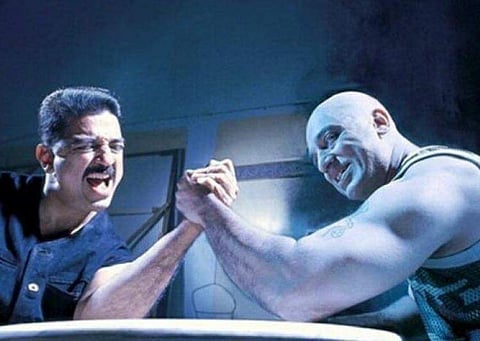

My friend and I chopped our hair recently, and we chatted about all the time and effort such a decision saves. A few minutes of shampooing and drying, and you are ready! The decision was all about convenience. But if you look at the women in our films…
In popular culture and cinema, haircuts often come with bad press, and are shown to be a result of dark, sinister events. Hollywood, for example, notoriously showed women cutting their hair in a frenzy, as a means to establish that they were about to break down. In Tamil cinema, the reasons were more diverse and also culturally entwined. Shaving your head off as a religious sacrifice has found quite some representation: Manorama in Vettri Kodi Kattu or Poorna in Kodiveeran.
The act is a drastic gesture and an indication of the intensity of their prayer. And then, there’s tonsuring as a form of punishment. In Anegan, Samudra’s (Amyra Dastur) hair is cut by her father, after he catches her with Munaruna (Dhanush). In Seval, Parijatham’s (Poonam Bajwa) hair is shaved because she is suspected to have a relationship with Murugesan.
It doesn’t help that she is a widow, or that Murugesan laments the act as a ‘punishment’. In Muppozhudhum Un Karpanaigal, Meenakshi (Anupama Kumar), another widow, shaves her head to avoid unnecessary, unsolicited male attention. In films like Snegithiye or Thirupaachi, haircuts are acts of petty revenge, used to shame.
Haircuts have also served to cater to the evolving male gaze. In Sathileelavathi, Leela (Kalpana) cuts her hair and gets a makeover to get the attention of her husband. There’s the famous Arukkani from Gopurangal Saivathillai, whose haircut, among other changes, is to make her look more attractive for her husband.
There’s also Raja Enga Raja, where Raja (Goundamani) wants Lakshmi (Ramya Krishnan) to be modern, but not too much, because ‘kalachara seerazhivu’. This trend has followed well into the late 2000s with Jhansi (Sadha) in Unnale Unnale getting a makeover to impress Karthik (Vinay). This scene finds a terrible analogy in cows mating. Grooming and style exist, in these films, mainly to support the design of patriarchy.
Hair is thought to be such an important, visible symbol of femininity, and when she cuts it off, it is often implied that she has made herself less feminine, less attractive. The popular notion is that ‘short hair’ is a symbol of ‘power’. This is why in many films that attempt to show a woman with physical or mental strength, she is often shown to sport short hair (Kabali and Bigil, for example). The implication is clear. If you want to be taken seriously, try appearing ‘masculine’. Women’s choices come with social repercussions; men’s choices are dictated by only convenience. This gets drummed in by our cinema as well.
Even in a film like Yuddham Sei, where the choice to shave off hair makes logical sense, it is shown to be a product of trauma. Why does short hair always have to stand for something profound? This is why, when in a film like Oh Baby, where Savithri (Samantha) chops off her hair purely for personal choice, it is such a relief.
Once, Hilary Clinton famously joked that women must pay attention to their hair, because everyone else does. No wonder then that her joke title for her memoir was, ‘The Scrunchie Chronicles: 112 Countries And It’s Still All About The Hair.’ Even something like hair becomes an important symbol when questioning patriarchy and its standards.
Whether we like it or not, hair does matter. I remember chopping off my waist-long hair to a shoulder-length cut and being scared to go shorter, as I didn’t want to risk being labelled a ‘boy’. It has taken me a decade to muster up the courage to realise that ‘it doesn’t matter’. The conversation with my friend set me out on this journey to see if our choices, and conversations, get represented in cinema, even in the slightest. We hope to see it happen soon.